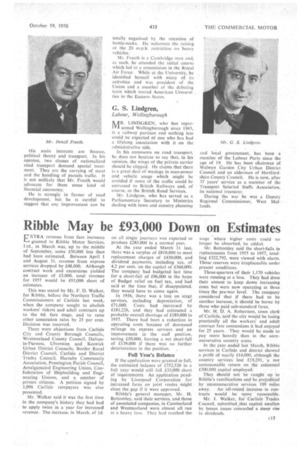Ribble May be £93,000 Down on Estimates
Page 53

If you've noticed an error in this article please click here to report it so we can fix it.
EXTRA revenue from fare increasc,s 1—, granted to Ribble Motor Services, Ltd., in March was, up to the middle of September, some £50,000 less than had been estimated. Between April 1 and August 31, revenue from express services dropped by £48,000. Although contract work and excursions yielded an increase of £5,000, total revenue for 1957 would be £93,000 short of estimates.
This was stated by Mr. F. D. Walker, for Ribble, before the Northern Traffic Commissioners at Carlisle last week, when the company sought to abolish workers' tickets and adult contracts up to the 6d. fare stage, and to raise other concession rates by 25 per cent. Decision was reserved.
There were objections from Carlisle City and County Borough Councils, Westmorland County Council, Daltonin-Furness, Ulverston and Keswick Urban District Councils, Border Rural District Council, Carlisle and District Trades Council, Harraby Community Association, Pennington Parish Council, Amalgamated Engineering Union, Confederation of Shipbuilding and Engineering Unions, and a number of private citizens. A petition signed by 1,096 Carlisle ratepayers was also presented.
Mr. Walker said it was the first time in the company's history they had had to apply twice in a year for increased revenue. The increase, in March, of -Id. on all single journeys was expected to produce £285,000 in a normal year.
At the year ended March 31 last, there was a surplus of £810,000 to meet replacement charges of £450,000, and dividend payments, including tax, of 4.2 per cent, on the capital of £360,000. The company had budgeted last time for a short-fall of £96,000 in the hope of Budget relief on fuel tax, and had said at the time that, if disappointed, they would have to come again.
In 1956, there was a loss on stage services, including depreciation, of £71,000. Costs had increased by £181,226, and they had estimated a probable overall shortage of £189,000 in 1957. There had been a reduction in operating costs because of decreased mileage on express services and an improvement in the staff position, saving £50,000, leaving a net short-fall of £139,000 if there was no further
deterioration in the position. _ Full Year's Balance
If the application were granted in full, the estimated balance of £752,520 in a full year would still fall £33,000 short of requirements. An application pending by Liverpool Corporation for increased fares on joint routes might close the gap if it were approved.
Ribble's general manager, Mr. H. Bottomley, said their services, and those of associated' companies, in Cumberland and Westmorland were almost all run at a heavy loss. They had reached the stage where higher costs could no longer be absorbed, he added.
Mr. BottomIey said the short-falls in replacements from 1955 to 1957, totalling £322,792, were viewed with alarm. Those reserves were irreplaceable under present conditions.
Three-quarters of their 1,170 vehicles were running at a loss. They had done their utmost to keep down increasing costs but were now operating at three times the pre-war level. The company considered that if there had to be another increase, it should be borne by those who paid sub-standard fares.
Mr. H. D. A. Robertson, town clerk of Carlisle, said the city would be losing practically all the workers' and adult contract fare concessions it had enjoyed for 25 years. They would be made to pay more heavily than in the unremunerative country areas.
In the year ended last March, Ribble services in Carlisle and district showed a profit of nearly £14,000, although the country services lost £19,291, a not unreasonable return on the estimated £300,000 capital employed.
They should not be caught up in Ribble's ramifications and be prejudiced by unremunerative services 100 miles away. An all-round increase in contracts would be more reasonable.
Mr. J. Walker, for Carlisle Trades Council, submitted ,that capital swollen by bonus issues concealed a steep rise in dividends.












































































































